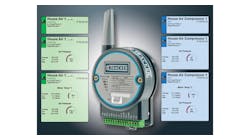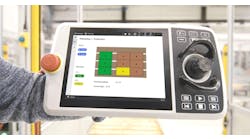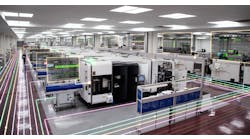Platform for Smart Factory Automation
Overcoming the Machinist Shortage
Some manufacturers may feel like David battling Goliath, especially in a highly focused product sector like cutting tool design and production. But, in this era of automation — the Industry 4.0 era — some precision grinding operations are discovering the advantages to being smaller. Automation technology has leveled the playing field and now smaller means nimble, niche, and for the first time heading in the same direction as the big guys.
New technology means that smaller businesses have access to a huge amount of capability that in the past may have been too large an investment to consider. Automation also reduces the cost of manufacturing, meaning cutting-tool manufacturers do not need a huge turn over to be viable and competitive. The networking of older machines can be achieved at relatively low cost - and the production benefits can be huge.
A report by Deloitte showed high-performing manufacturers outpace their competitors not because they’re bigger, but because they leverage a) brand and reputation, b) new markets and customers, and c) advancing technology. Let’s look at how to use available networking and automation technology so your business can match or exceed the quality and productivity of the established giants.
1) Focus on quality — Among specialty grinding operations we know that it’s really not size that matters. It’s the quality of your grinding. This is where the big advantage is for smaller companies. In tool manufacturing, it’s quality that speaks loudest. Smaller companies now are able to run production that automatically measures and corrects tool grinding precision, to ensure that the accuracy is no less than the very best.
2) Program for expertise — Not sure you have the experience to specialize? The right software can fix that. Now, if you have the right machine and the right software, you can grind a wide variety of tools without having special knowledge about them, or previous experience with that tool type.
In terms of competition, the good news is that larger tool companies aren’t as interested in specializing. They’re after the big volume or catalogue production, leaving plenty of opportunity for you to swoop in and get the niche clients.
3) Lights out — Yes, it’s possible to increase product volume. Even though you’re smaller, automation can boost your production output. Gone are the days where machines must be manned all the time, and all the weekend. By networking and automating your existing systems you can run 24 hours a day, seven days a week in ‘lights out’ mode.
4) Machine networking — Not only can production be automated but your whole process can benefit from machine networking. Integrate your ordering, invoicing and dispatch to reduce administration and allow flexible work. You’ll gather insights into your whole process from end to end, making it faster for you to adapt and change to different market pressures. With a finger on the pulse of your production, you can optimize it and watch it take off.
5) Internet marketing — As Deloitte reported, it’s not just the manufacturing technology that can be your competitive edge. The internet as a marketing tool is another great leveler. Smaller companies can use the power of the Internet to compete with more targeted marketing and brand development. You can use low-cost online activities like social media or create a presence in online forums to build your reputation. The tool and grinding community is heavily networked and the more you promote your brand, the more people will be talking about you – no matter how big you are.
There are certainly specific challenges that always face smaller manufacturers. Smaller businesses cannot access volume discounts on materials, they cannot produce as much volume, they have less money to invest in R&D, they have a smaller operating area and often lower brand awareness. The most effective way to build your brand is by delivering premium service – designing and introducing tools swiftly at the best quality.
On the flip side the availability of machine networking and automation technology means small manufacturers can make their mark in niche areas. They can specialize where the big guys cannot or will not go, operate ‘lights out’ to increase their output and leverage the power of the internet to spread the word. Goliath should be worried.
Thomson Mathewis the software product manager for ANCA, a designer and manufacturer of CNC grinding machines.








